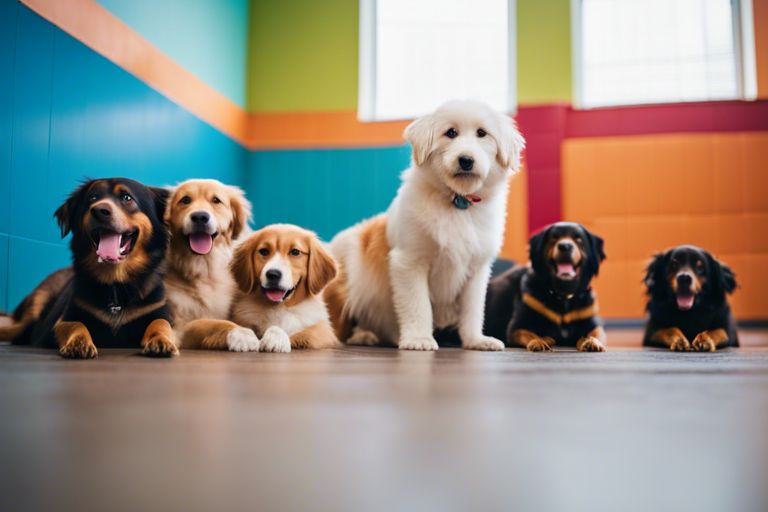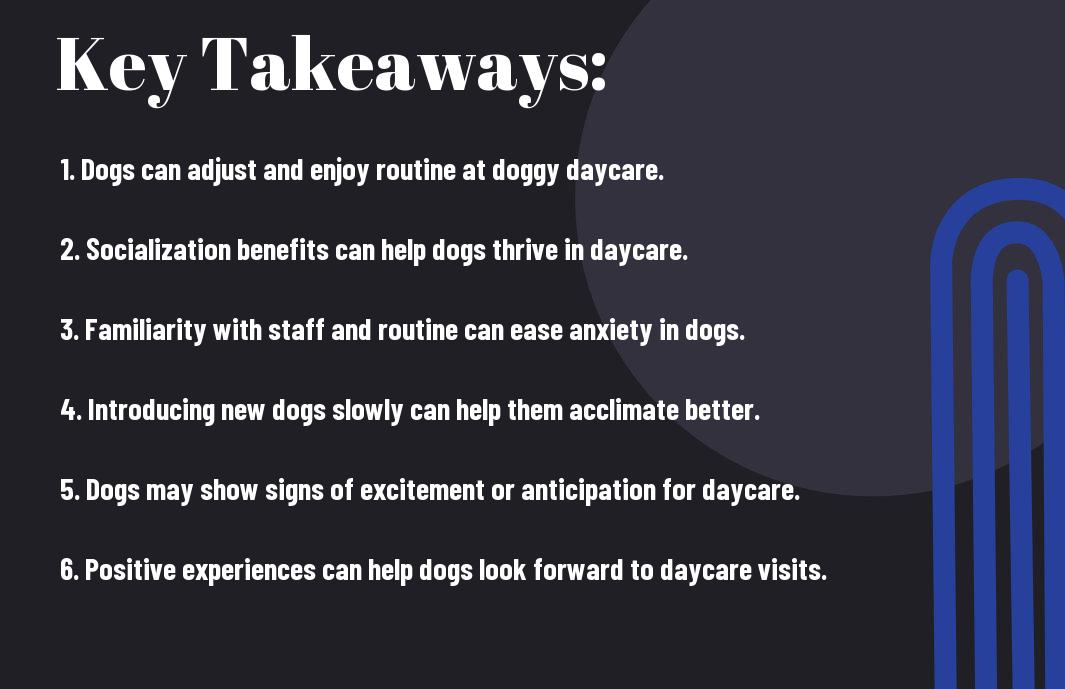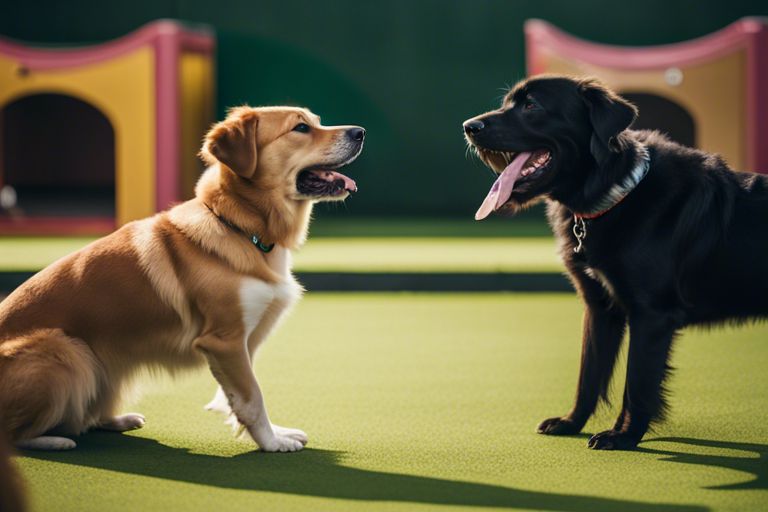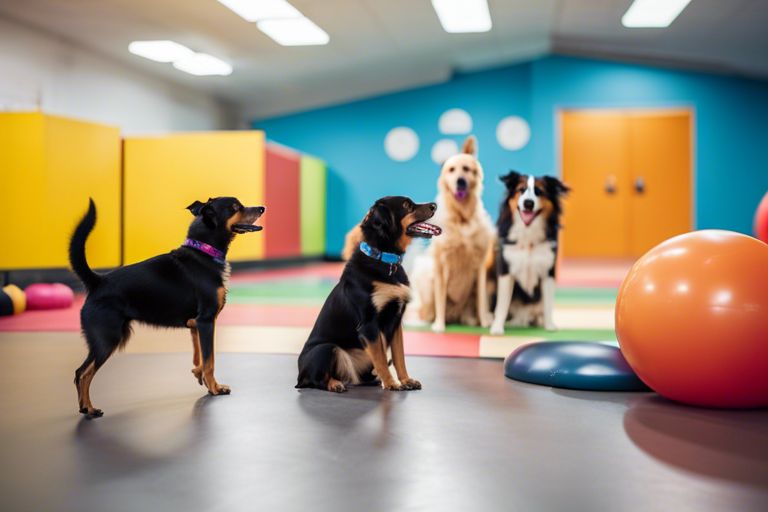Over time, you may be wondering if your furry friend will ever feel at home in a doggy daycare setting. The idea of leaving your pup in a new environment can be nerve-wracking, but rest assured, most dogs do eventually get used to doggy daycare with time and patience. Understanding their behavior cues and giving them the opportunity to adjust at their own pace can make all the difference in helping them feel comfortable and secure while you’re away. Here’s what you need to know about how dogs acclimate to the doggy daycare experience.
Key Takeaways:
- Dogs can adapt to doggy daycare: Over time, dogs can become more comfortable with the routine and environment of doggy daycare, especially with positive reinforcement and consistent visits.
- Initial anxiety is normal: It is common for dogs to experience some level of anxiety during their first few visits to doggy daycare, but this can decrease as they become familiar with the setting and other dogs.
- Individual differences: Just like people, dogs have unique personalities and preferences, so some may take longer to adjust to doggy daycare while others may feel comfortable right away.
The Concept of Habituation
What is habituation?
Your dog, like all animals, has the ability to habituate to new environments and situations. Habituation is a process where an animal decreases or stops responding to a stimulus after repeated exposure to it. In the context of doggy daycare, this means that your furry friend can become accustomed to the sights, sounds, and smells of the daycare facility over time.
How does habituation work in animals?
An animal’s initial reaction to a stimulus is usually quite strong. However, through repeated exposure without any negative consequences, the animal learns that the stimulus is not a threat and gradually reduces its response. For example, when your dog first goes to doggy daycare, it may be anxious or excited. But with regular visits and positive experiences, it learns that daycare is a safe and fun place to be.
One important aspect of habituation is that it is specific to the stimulus being presented. This means that while your dog may become used to doggy daycare, it may still react strongly to other new stimuli or environments.
Doggy Daycare: A New Environment
The initial reaction to doggy daycare
It’s completely normal for your dog to feel a bit overwhelmed or anxious when first introduced to a doggy daycare environment. The sights, sounds, and smells can be quite different from what they are used to at home. Your furry friend may exhibit behaviors such as pacing, whining, or even trying to hide at the beginning.
The role of novelty in canine behavior
Doggy daycare introduces a novel environment for your canine companion, which can simultaneously be exciting and intimidating. Dogs are naturally curious creatures, so the new sights, smells, and interactions can both stimulate and challenge them. This novel setting can lead to various reactions in your dog, from excitement and playfulness to apprehension and shyness.
Canines are known to be receptive to new experiences, and while some may adapt quickly to the novelty of doggy daycare, others may take more time to adjust. Each dog is unique, and their response to this new environment will vary based on factors such as their temperament, past experiences, and socialization skills.
The Adaptation Process
Keep Doggy daycare dropout? – puppy puppies dogs in mind as you consider the adaptation process of your dog to daycare. Every dog is unique, and your furry friend may require some time to adjust to this new environment and routine.
Short-term adjustments
Adaptation to doggy daycare can involve a period of short-term adjustments where your dog learns to navigate the new social setting, interactions with other dogs, and the daycare routine. During this phase, you may notice some initial signs of stress or anxiety, such as excessive barking, pacing, or neediness when you drop them off. It’s important to give your dog time to acclimate and support them through this transition period.
Long-term changes in behavior and temperament
For some dogs, long-term changes in behavior and temperament may occur after frequent exposure to doggy daycare. Over time, your dog may become more socialized, confident, and well-behaved around other dogs and people. This can lead to positive changes in their overall behavior and temperament, such as better leash manners, improved social skills, and reduced separation anxiety. Regular attendance at daycare can also provide mental stimulation and physical exercise, promoting a healthier and happier pup.
To fully reap the benefits of doggy daycare, it’s important to observe how your dog responds in the long term. While short-term adjustments are natural, keep an eye out for positive changes over time. If you notice any concerning shifts in behavior or temperament, consider discussing them with the daycare staff or a professional trainer to address any underlying issues.
Factors Influencing Adaptation
Despite the general positive experience most dogs have at doggy daycare, there are several factors that can influence how quickly and well your furry friend adapts to this new environment. Understanding these factors can help you support your dog during this transition period.
Breed and temperament
Factors such as your dog’s breed and temperament can play a significant role in how easily they adjust to doggy daycare. Some breeds are naturally more social and outgoing, making it easier for them to interact with other dogs in a daycare setting. On the other hand, more reserved or anxious breeds may take longer to feel comfortable in a new environment.
Additionally, individual temperament plays a crucial role. If your dog is generally friendly, confident, and well-socialized, they are more likely to adapt quickly to the daycare routine. However, if your dog is shy, fearful, or reactive, they may need more time and patience to acclimate to the daycare environment.
- Factors such as breed and temperament can influence how quickly your dog adapts to doggy daycare.
After considering these factors, you can better assess how your dog may respond to the daycare experience.
Socialization and training
Influencing your dog’s adaptation to doggy daycare is their level of socialization and training. Dogs that have been properly socialized from a young age, exposed to various experiences, people, and dogs, tend to be more adaptable in new situations. Training also plays a significant role, as dogs that have basic obedience skills are better equipped to handle the structured environment of daycare.
To further support your dog’s adaptation to daycare, continue socializing them with other dogs and people in different environments. Regular training sessions focusing on basic commands and positive reinforcement will also help them feel more confident and secure in unfamiliar settings.
Quality of doggy daycare
Socialization opportunities, staff expertise, and facility conditions all contribute to the quality of doggy daycare and can impact your dog’s adaptation. A well-run daycare with trained staff, appropriate dog-to-staff ratios, and a safe, clean environment is more likely to create a positive experience for your furry friend.
Choosing a daycare that aligns with your dog’s needs and preferences, such as offering playgroups based on size or temperament, can also enhance their comfort and enjoyment. Additionally, receiving detailed feedback from the daycare staff about your dog’s behavior and interactions can give you insight into their progress and well-being during their time at daycare.
The quality of the doggy daycare you select can significantly influence your dog’s overall experience and adaptation.
Signs of Adaptation
Once again, you may be wondering how your furry friend is adjusting to their new routine at doggy daycare. There are several signs that indicate your dog is adapting well to this environment.
Decreased stress and anxiety
Any initial signs of stress or anxiety, such as whining, pacing, or excessive barking when dropping off your dog, should decrease over time as they become more familiar and comfortable with the surroundings and routine at doggy daycare. You may notice a more relaxed and content demeanor when you pick them up at the end of the day.
Increased socialization and play
Decreased hesitation to interact with other dogs and a greater willingness to engage in playful activities are positive indicators that your dog is benefitting from the socialization opportunities at doggy daycare. This can lead to improved confidence and overall well-being for your furry companion.
This increased socialization and play can have long-lasting benefits for your dog, as they learn important social cues and behaviors from interacting with a diverse group of canine friends. It can also help with their physical health and mental stimulation, keeping them happy and active.
Improved obedience and focus
Adaptation to the structured environment at doggy daycare can lead to improved obedience and focus in your dog. They learn to follow commands from trained staff and respond positively to the routine and expectations set in place. This can translate to better behavior and attentiveness at home as well.
This improved obedience and focus is a great added bonus to the fun and social aspects of doggy daycare. Your furry friend will not only enjoy their time there but also come home with new skills and a better ability to listen and respond to you as their owner during playtime and training sessions.
The Importance of Acclimation
Gradual exposure to doggy daycare
Importance of acclimating your dog to the daycare environment cannot be overstated. Your furry friend may initially feel overwhelmed and anxious in a new environment with many unfamiliar faces and scents. To help them adjust, it’s important to start slow by gradually exposing them to short daycare sessions. This approach allows your dog to become familiar with the surroundings and routines at their own pace.
Building trust and confidence
Dogs, like humans, thrive on routine and familiarity. By consistently bringing your dog to daycare and ensuring positive experiences, you are building trust and confidence in the daycare staff and environment. This trust is crucial for your dog to feel safe and secure while in their care, ultimately leading to a positive daycare experience.
doggy daycare can be a new and potentially intimidating experience for your furry companion. However, by taking the time to acclimate them to the environment and allowing them to build trust with the caregivers, you are setting them up for success. This process may take time, but the benefits of a happy and confident doggy daycare attendee are well worth the effort.
To wrap up
On the whole, dogs can definitely get used to doggy daycare with time and familiarity. Just like humans, dogs thrive on routine and familiarity, so once they become accustomed to the routine and environment of a daycare facility, they can start to feel more comfortable and secure. By gradually introducing your dog to daycare and monitoring their behavior and well-being, you can help them adapt and potentially even come to enjoy their time at daycare.
Be mindful of, every dog is unique, so it’s important to pay attention to your dog’s individual needs and preferences when it comes to daycare. With patience, positive reinforcement, and a bit of time, your furry friend may just become a daycare regular who eagerly looks forward to their fun-filled days of play and socialization with other pups.
FAQ
Q: Do dogs get used to doggy daycare?
A: Yes, most dogs will eventually get used to doggy daycare. It may take some time for them to adjust to the new environment and routine, but with proper introduction and socialization, they can thrive in daycare.
Q: How long does it take for a dog to adjust to doggy daycare?
A: The time it takes for a dog to adjust to doggy daycare varies from dog to dog. Some dogs may feel comfortable after a few visits, while others may take a few weeks to settle in. Patience and positive reinforcement are key in helping your dog acclimate to daycare.
Q: What can I do to help my dog adjust to doggy daycare?
A: To help your dog adjust to doggy daycare, start by taking them for short visits to familiarize them with the environment. Gradually increase the duration of their stays and provide positive reinforcement. It’s also important to choose a reputable daycare facility with trained staff who can cater to your dog’s needs.
Q: Are there any signs that indicate my dog is not adjusting well to doggy daycare?
A: Yes, some signs that indicate your dog is not adjusting well to daycare include excessive barking, withdrawal, aggression, or destructive behavior. If you notice any of these signs, it’s important to address them with the daycare staff and consider alternative options or training for your dog.
Q: Can doggy daycare benefit my dog in the long run?
A: Doggy daycare can provide numerous benefits for your dog, such as socialization, exercise, mental stimulation, and companionship. Over time, regular attendance at daycare can help improve your dog’s behavior, confidence, and overall well-being.
Are strawberries toxic for dogs
Demystifying Anal Gland Issues in Dogs: Your Comprehensive Guide from the American Kennel Club




